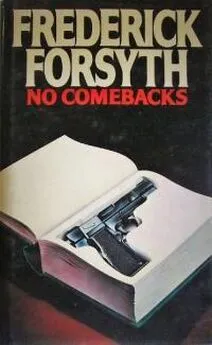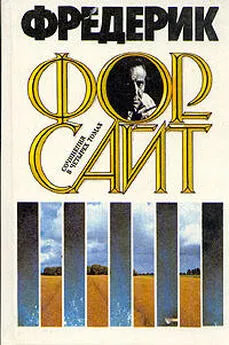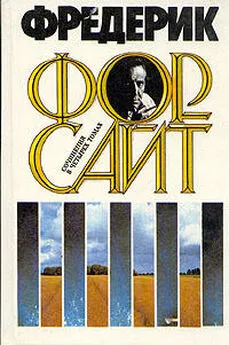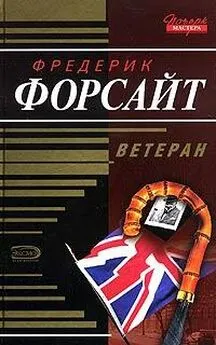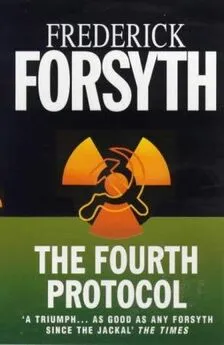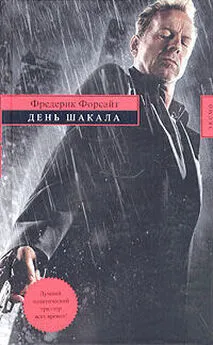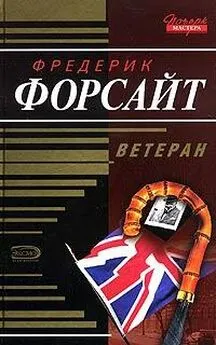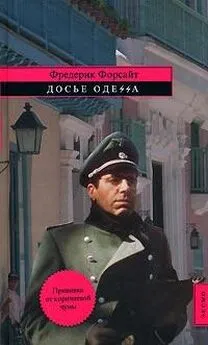Фредерик Форсайт - Нет возврата
- Название:Нет возврата
- Автор:
- Жанр:
- Издательство:Hutchinson
- Год:1982
- Город:London
- ISBN:0-09-147870-7
- Рейтинг:
- Избранное:Добавить в избранное
-
Отзывы:
-
Ваша оценка:
Фредерик Форсайт - Нет возврата краткое содержание
Перед Вами сборник из 10 рассказов, держащих читателя в напряжении, посвященных изменам, шантажу, убийствам и мести, кульминации которых шокируют неожиданными поворотами судеб. На этих страницах оживают персонажи, которых Вы не скоро сможете забыть. Живые люди бесповоротно оказываются в мире, из которого уже нельзя вернуться, если перейти "точку невозврата", перейдя от простого манипулирования покупкой и продажей человеческой жизни к смертельным актам насилия. Содержание:
1. Никаких улик
2. В Ирландии не водятся змеи
3. Император
4. Бывают же дни…
5. Шантаж
6. Used in Evidence - англ.
7. Абсолютная привилегия
8. Долг
9. A Careful Man - англ.
10. В дураках
Нет возврата - читать онлайн бесплатно полную версию (весь текст целиком)
Интервал:
Закладка:
Armitage junior gave vent to the noisy sigh of one whose patience has been too long tried.
'Three, I appoint as executor the following gentleman, a solicitor, and ask that he administer my estate, and pay my duty payable thereon, and execute the provisions of this my will, namely: Martin Pound of Pound, Gogarty. Four, I ask my executor at this point of the reading to open the enclosed envelope wherein he will find a sum of money to be used for the expenses of my burial, and for the settlement of his professional fees, and of any other disbursements incurred in the execution of my wishes. And in the event that there be any monies remaining from the enclosed sum, then do I direct that he donate such monies to any charity of his own choice.'
Mr Pound laid down the will and took up again his letter knife. From the unopened envelope he extracted five wads of £20 notes, all new and each encircled by a brown paper band indicating that the sum in each wad amounted to £1000. There was silence in the room. Armitage junior ceased exploring one of his cavities and stared at the pile of money with the indifference of a satyr observing a virgin. Martin Pound picked up the will again.
'Five, I ask my sole executor, in deference to our long friendship, that he assume his executive functions upon the day following my burial.'
Mr Pound glanced again over the top of his glasses.
'In the normal course of events I would have already visited Mr Hanson's business in the city, and his other known assets, to ensure that they were being well and properly run and maintained, and that no financial damage would accrue to the beneficiaries by neglect of the assets,' he said. 'However, I have only just formally learned of my appointment as sole executor, so I have not been able to do so. Now it appears I cannot begin until the day after the funeral.'
'Here,' said Armitage senior, 'this neglect, it wouldn't diminish the value of the estate, would it?'
'I cannot say,' replied Pound. 'I doubt it. Mr Hanson had excellent assistants in his City dealership and I have no doubt he trusted in their loyalty to keep things running well.'
'Still, hadn't you better get weaving?' asked Armitage.
'The day after the funeral,' said Pound.
'Well then, let's get the funeral over with as soon as possible,' said Mrs Armitage.
'As you wish,' replied Pound. 'You are his next of kin.' He resumed reading. 'Six, I give to…'
Here Martin Pound paused and blinked as if he had trouble reading what he read. He swallowed. 'I give to my dear and loving sister the rest and residue of my estate absolutely, in the confidence that she will share her good fortune with her lovable husband Norman and their attractive son Tarquin. The same being subject to the conditions of paragraph seven.'
There was a stunned silence. Mrs Armitage dabbed delicately at her eyes with a cambric handkerchief, less to wipe away a tear than cover the smile that twitched at the corner of her mouth. When she removed the handkerchief she glanced at her husband and son with the air of an over-age hen who has just lifted one buttock to find a solid gold egg reposing beneath. The two male Armitages sat with open mouths.
'How much was he worth?' demanded the senior one at last.
'I really couldn't say,' said Pound.
'Come on, you must know,' said the son. 'Roughly. You handled all his affairs.'
Pound thought of the unknown solicitor who had drawn up the will in his hand. 'Almost all,' he said.
'Well…?'
Pound bit on the bullet. However unpleasant he found the Armitages, they were the sole beneficiaries of his late friend's.will. 'I should have thought, at current market prices, assuming all the estate is called in and realized, between two and a half and three million pounds.''
'Bloody hell,' said Armitage senior. He began to have mental images. 'How much will death duties come to?'
'Quite a large amount, I'm afraid.'
'How much?'
'With such a sizable estate, the bulk will be adjusted at the highest rate, seventy-five per cent. Overall, I suppose something like sixty-five per cent.'
'Leaving a million clear?' asked the son.
'It's a very rough estimate, you understand,' said Pound helplessly. He thought back to his friend Hanson as he had been: cultured, humorous, fastidious. Why, Timothy, for heaven's sake why? 'There is paragraph seven,' he pointed out.
'What's it say?' demanded Mrs Armitage, breaking off from her own reverie concerning her social take-off.
Pound began to read again. 'I have, all my life, been possessed by a great horror of one day being consumed beneath the ground by worms and other forms of parasites,' he read. 'I have therefore caused to be constructed a lead-lined coffin which now reposes in the funeral parlour of Bennett and Gaines, in the town of Ashford. And it is in this that I wish to be committed to my last resting place. Secondly, I have never wished that one day I might be dug up by an excavator or anything else. In consequence of this I direct that I shall be buried at sea, specifically twenty miles due south of the coast of Devon where I once served as a naval officer. Finally, I direct that it shall be my sister and brother-in-law who shall, out of respect for their lifelong love for me, be the ones who impel my coffin towards the ocean. And to my executor I direct that should any of these wishes not be fulfilled, or any impediment be placed before the arrangements by my beneficiaries, then shall all that has gone before be null and void, and I direct that then my entire estate be bequeathed to the Chancellor of the Exchequer.'
Martin Pound looked up. Privately he was surprised to learn of his late friend's fears and fancies, but he gave no sign of it.
'Now, Mrs Armitage, I have to ask you formally; do you object to the wishes of your late brother as expressed in paragraph seven?'
'It's stupid,' she replied, 'burial at sea, indeed. I didn't even know it was allowed.'
'It is extremely rare, but not illegal,' replied Pound. 'I have known of one case before.'
'It'll be expensive,' said her son, 'much more than a cemetery burial. And why not cremation anyway?'
'The cost of the funeral will not affect the inheritance,' said Pound testily. 'The expenses will come out of this.' He tapped the £5000 at his elbow. 'Now, do you object?'
'Well, I don't know…'
'I have to point out to you that if you do, the inheritance is null and void.'
'What does that mean?'
'The state gets the lot,' snapped her husband.
'Precisely,' said Pound.
'No objection,' said Mrs Armitage. 'Though I think it's ridiculous.'
'Then as next of kin will you authorize me to make the arrangements?' asked Pound.
Mrs Armitage nodded abruptly.
'The sooner the better,' said her husband. 'Then we can get on with the probate and the inheritance.'
Martin Pound stood up quickly. He had had enough.
"That constitutes the final paragraph of the will. It is duly signed and witnessed twice on every page. I think therefore there is nothing more to discuss. I shall make the necessary arrangements and contact you in respect of time and place. Good day to you.'
The middle of the English Channel is no place to be on a mid-October day unless you are an enthusiast. Mr and Mrs Armitage contrived to make perfectly plain before they had cleared the harbour mole that they were definitely not.
Mr Pound sighed as he stood in the wind on the afterdeck so as not to have to join them in the cabin. It had taken him a week to make the arrangements and he had settled on a vessel out of Brixham in Devon. The three fishermen who ran the inshore trawler had taken the unusual job once they were satisfied over the price and assured they were breaking no law. Fishing the Channel provided slim pickings these days.
It had taken a block and tackle to load the halfton coffin from the rear yard of the Kentish undertakers onto an open-backed one-ton van, which the black limousine had followed throughout the long haul down to the southwest coast that morning. The Armitages had complained throughout. At Brixham the van had drawn up on the quayside and the trawler's own davits had brought the coffin aboard. It stood now athwart two beams of timber on the wide after-deck, waxed oak and polished brass gleaming under the autumn sky.
Tarquin Armitage had accompanied the party in the limousine as far as Brixham, but after one look at the sea had elected to stay within the warm confines of a hostelry in town. He was not needed for the burial at sea in any case. The retired Royal Navy chaplain whom Pound had traced through the chaplaincy department of the Admiralty had been happy enough to accept a generous stipend for his services and now sat in the small cabin also, his surplice covered by a thick overcoat.
The skipper of the trawler rolled down the deck to where Pound stood. He produced a sea chart which flapped in the breeze, and pointed with a forefinger at a spot twenty miles south of start point. He raised an eyebrow. Pound nodded.
'Deep water,' said the skipper. He nodded at the coffin. 'You knew him?'
'Very well,' said Pound.
The skipper grunted. He ran the small trawler with his brother and a cousin; like most of these fishermen, they were all related. The three were tough Devonians, with nut-brown hands and faces, the sort whose ancestors had been fishing these tricky waters since Drake was learning the difference between main and mizzen.
'Be there in an hour,' he said, and stumped back forward.
When they reached the spot, the captain held the vessel with her bow into the weather, holding station with an idling engine. The cousin took a long piece of timber, three planks bolted together with crosspieces on the underside and 3 feet wide, and laid it across the starboard rail, smooth side up. The chipped timber rail took the plank almost at the mid-section, like the fulcrum of a seesaw. One half of the planks lay towards the deck, the other jutted out over the heaving sea. As the captain's brother manned the davit motor, the cousin slipped hooks under the coffin's four brass handles.
The engine revved and the davits took the strain. The great coffin lifted off the deck. The winchman held it at a height of 3 feet and the cousin manoeuvred the oaken casket onto the plank. He pointed it headfirst towards the sea and nodded. The winchman let it down so it came to rest directly above the supporting rail. He slackened off and the coffin creaked into position, half in and half out of the trawler. While the cousin held it steady, the winchman descended, cleared away the shackles and helped lift the inboard edge of the planks to the horizontal. There was little weight on them now, for the coffin was evenly balanced. One of the men looked to Pound for guidance and he summoned the chaplain and the Armitages from their shelter.
The six people stood in silence under the lower clouds, occasionally dusted by a misty spray blown from the crest of a passing wave, steadying themselves against the heave and pitch of the deck. To be fair to him, the chaplain kept it as short as decently possible, as well he might, for his white hair and surplice flayed about him in the breeze. Norman Armitage was also bareheaded, looking sick as a parrot and chilled to the bone. What he thought of his late relative, now lying a few feet from him encased in layers of camphor, lead and oak, could only be surmised. Of Mrs Armitage nothing could be seen between fur coat, fur hat and woollen scarf save a pointed, freezing nose.
Martin Pound stared at the sky as the priest droned on. A single gull wheeled on the wind, impervious to wet, cold, and nausea, unknowing of taxes, wills and relatives, self-sufficient in its aerodynamic perfection, independent, free. The solicitor looked back at the coffin and beyond it the ocean. Not bad, he thought, if you are sentimental about such things. Personally he had never been caring about what happened to him after death, and had not known that Hanson had been so concerned. But if you did care, not a bad place to lie. He saw the oak beaded with spray that could not enter. Well, they'll never disturb you here, Timothy old friend, he thought.
Читать дальшеИнтервал:
Закладка:
